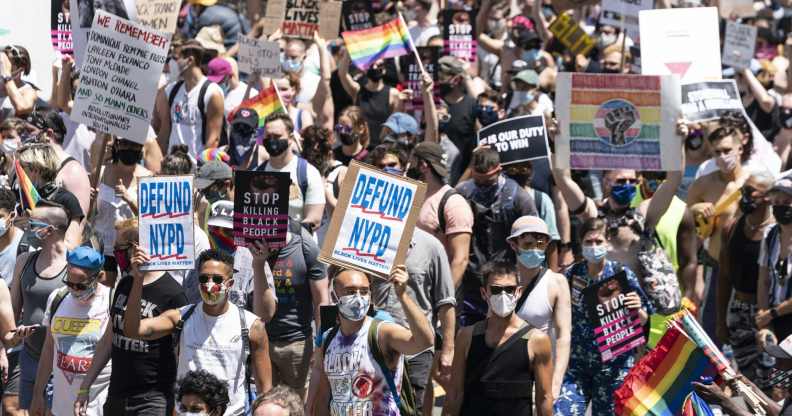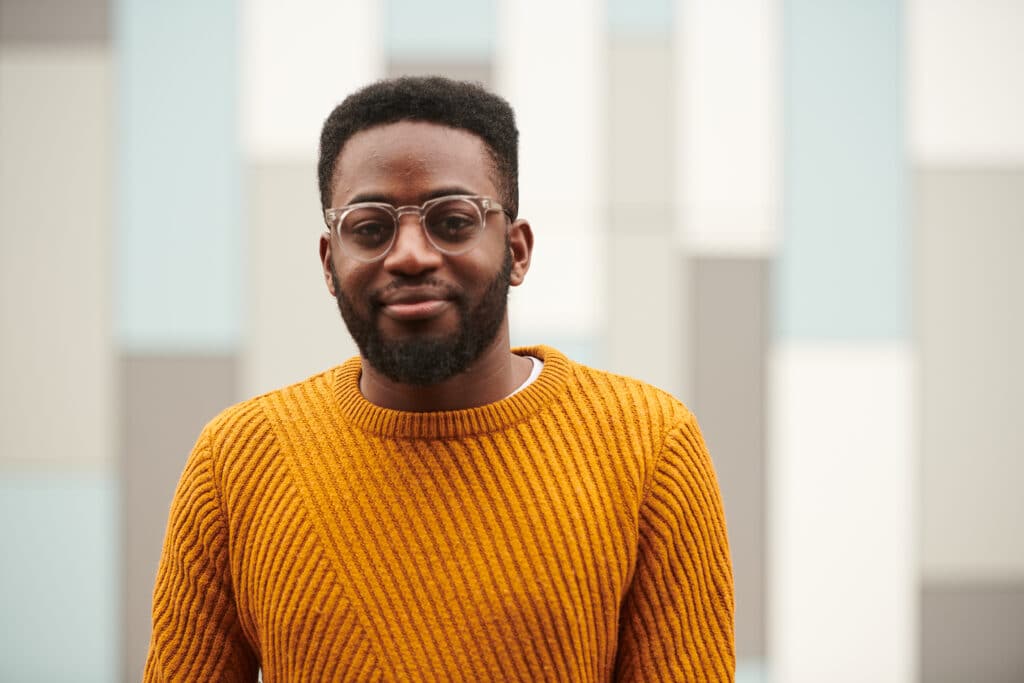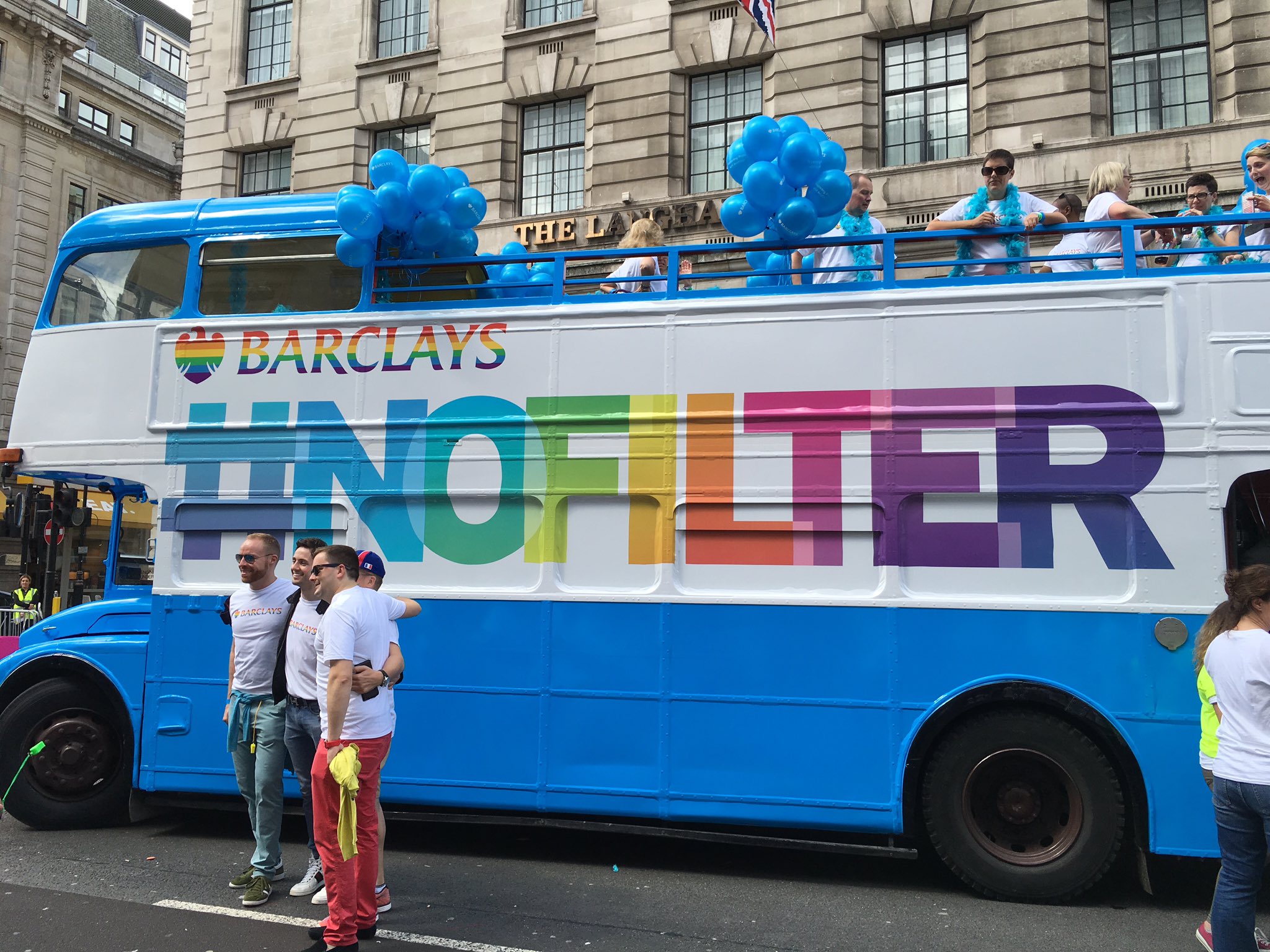Big brand backlash, protest and the pandemic: Has the Pride ‘bubble’ burst forever?

A joint queer liberation march and Black Lives Matter rally and against police brutality in New York City, June 2020 (Lev Radin/Pacific Press/LightRocket/Getty)
Could Pride be about to return to its radical roots? PinkNews investigates what the pandemic and a new era of protest means for the future.
The past 18 or so months have changed the world in unprecedented ways, with lockdown and increased attention on systemic racism and other injustices awakening many young people to the power of activism and protest, and the importance of accountability.
Suddenly, the problems plaguing Pride – the sense it’s become too sanitised and commercialised, more parade than protest – are getting harder and harder to ignore.
“The bubble that presumed that Pride events were this amazing opportunity for the queer community, I think that has burst,” Dr Francesca Ammaturo, a senior lecturer in sociology and human rights, tells PinkNews.
“Last year really was the tipping point because of the convergence between COVID and Black Lives Matter,” she says. “Once you lift the veil, once you open Pandora’s box, there’s no turning back.”
As a second summer of COVID-19 leads to more cancellations, it’s hard to imagine what Pride will look like when it finally returns to the post-pandemic era.
Ammaturo predicts we’ll see an increasing “questioning of the inherent goodness of Pride” as LGBT+ people and allies demand more from the events and their organisers, particularly in terms of intersectionality.
The past assumption that Pride is purely positive has meant “there is not enough attention on the less positive or more problematic aspects” of a model which largely caters to cisgender, white, able-bodied people, and the corporations chasing their cash.
Now there’s quite clearly a hook and a reason to be asking difficult questions.
This reckoning has already reached Pride in London, whose five senior-most members were forced to resign earlier this year amid damning allegations of racism and bullying.
The “culture of racism” at the top levels was exposed by Rhammel Afflick, who quit his role as director of communications citing a “reluctance to accept that the liberation of LGBT+ people must be coupled with the fight against sexism, ableism, racism and other forms of unacceptable discrimination”.
Speaking to PinkNews, Afflick is keen to point out that none of these issues are new – he himself had been speaking of it for years, while other queer Black activists had been fighting far longer – but after the 2020 Black Lives Matter protests, it suddenly went mainstream.

Rhammel Afflick quit Pride for London after seven years citing concerns about racism. (Supplied)
“I think one of the reasons we’re having this recognition more publicly, because I wouldn’t say it’s a new recognition, but publicly, is that there’s now a space for it to happen,” he said.
“What is new is perhaps the popularisation of certain words, and certain elements of the conversation are available in mainstream media … There’s also a lot more queer Black people with platforms whose voices are now emerging on the mainstream. And that, I think, has been shaking the table.”
What it meant for Pride in London was an opportunity for people to hold organisers to account on an issue they didn’t know about before, or didn’t know well enough to speak out on.
“Now, there’s quite clearly a hook and a reason to be asking difficult questions, particularly with Pride in London’s 20th anniversary coming up” he says.
Another factor which Afflick says “has been missed completely” is that the upcoming generation is far more politically engaged than many have previously realised.
“They’ve been misrepresented as disengaged because they’re not taking part in formal processes, like local consultations on a road layout or things like that,” he said.
“But actually young people are still politically astute, they know what’s happening and will genuinely turn up and support something. And I think that is an important context to this conversation.”

Demonstrators at the 2020 Critical Pride parade in Spain, an alternative to the official Pride from an anti-capitalist, transfeminist, and anti-racist perspective. (Marcos del Mazo/LightRocket/Getty)
Ammaturo predicts increasing engagement in these issues will prompt a “top down” democratisation of Pride, with participants demanding more racial advocacy from the events.
“An organisation like Pride in London will not be able to dictate a certain line on the theme of Pride anymore as much as they used to do – and that will be the same for other countries,” she said.
Afflick, however, is more cynical. He finds it harder to see a trend, pointing out that positive change from Pride in London only came about as a result of significant public pressure.
“I think it will be harder to avoid, is probably the easiest way of saying it,” he said. “It’s not that I think that we’ll see action necessarily, but it will certainly be something that [organisers] can’t avoid.”
Nevertheless, some events are paying attention – like New York City Pride, which recently made the decision to ban all police until 2025 to “acknowledge their harm” to the community.
There’s been talk of other US Pride events following suit, but Ammaturo doesn’t think we’ll see a “sweeping movement” of Pride parades turning against the police, at least not outside the English-speaking world.
“Other countries haven’t really arrived at the point where the police march openly at Pride,” she explained. While institutionalised racism certainly exists outside the US, the death of George Floyd hasn’t been the same catalyst elsewhere, so we’re unlikely to see the level of animosity felt by NYC Pride.
Pride and the big brand backlash
Ammaturo predicts the strongest backlash will be against corporate sponsors, warning that the question of commercialisation “casts a very long shadow on the future of Pride”.
“I think a good way of thinking about the position organisers now find themselves in is that Pride is so successful it’s become a victim of its own success,” she said.
“There’s a huge amount of resources required to bring all of these amazing crowds together, crowds of hundreds of thousands, millions of people. It becomes so big that obviously the efforts of grassroots activists would not suffice.”
Pride-goers no longer want to see floats of huge multinational corporations like Barclays, PWC and British Airways dominating the event at a time when grassroots activism is more powerful than ever – but the sponsors, unwelcome though they may be, are needed to foot the bill.
Ammaturo highlighted the approaching conflict between the “growing sense of alienation” caused by big brands and their financial necessity at large-scale events – events which may no longer be feasible as we enter what experts predict will be an “age of pandemics”.
Both she and Afflick pointed to a potential future “fragmentation” of Pride, becoming smaller, safer celebrations that better represent marginalised communities.
But in any case, Afflick says we shouldn’t be so quick to dismiss the corporate sponsors.
“Often the demands people make of Pride organisations are quite simplistic. It’s: ‘Get rid of the corporate stalls! Get rid of the floats!’ And I can understand why people take issue with them being at the heart of something which is about basic human rights,” he said.
“But actually, it doesn’t acknowledge how those organisations are constituted, and also the real breadth of people that we serve.
“One of the things that frustrates me is when people say it should be a march alone and forget everything else,” he continued. “Pride has a multitude of objectives in terms of amplifying voices. There is, of course, a protest. But there’s elements around [queer music and culture] as well, and I think there’s something great about that.”
Once they’ve been activated, I don’t think they’re gonna go back.
As well as being a vital funding source, the presence of corporate sponsors at Pride grants a level of visibility and safety that many people wouldn’t feel at a protest.
A parade or staged event is also easier for those who struggle with mobility – and issues of accessibility will only become more prominent after the virtual Prides of the COVID era.
“For people with accessibility issues, [2020] was probably the first time many were able to get a glimpse of what these events would be like, because probably they had never participated or there were barriers to their participation,” Ammaturo said.
“In the context of going back to ‘normal life’, I think this will be one of the main questions that Pride events will have to answer.”
The future must be different
One thing for certain, though, is that the dynamic has changed.
The interruption forced by COVID-19 has unexpectedly given people the breathing room to ask what they want and need of Pride going forward, and a year of Black Lives Matter marches has empowered them to demand it.
“A lot of young people, especially people of colour who participated in BLM protests, once they’ve been activated, I don’t think they’re gonna go back,” Ammaturo says. “They will bring their ferment, they will bring their activism wherever they go, be it Pride be any other political event.
“So I think that there is a lot to be expected. And if those who organise Pride events go forward with the mentality of governing it as a single, coherent event, they will not succeed.”


